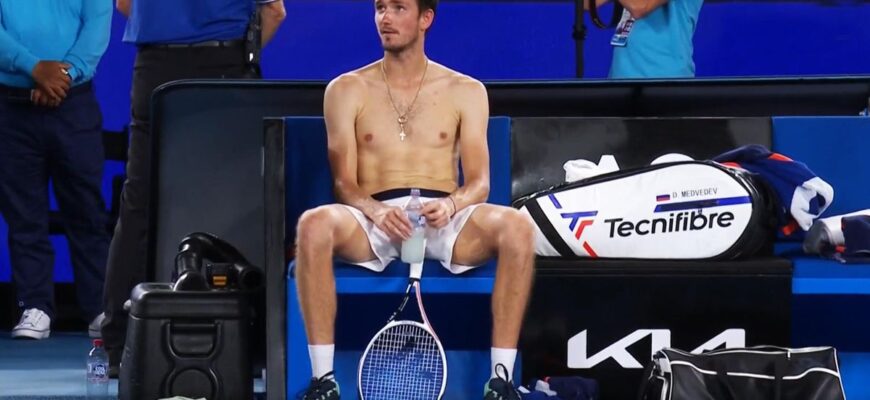After a demanding run at the Shanghai Masters, Daniil Medvedev offered a candid, almost laconic, assessment of his physical state: “Everything hurts.” This seemingly simple statement provides a stark, unvarnished look into the relentless grind faced by professional tennis players at the highest echelons of the sport.
The Invisible Wounds of the ATP Tour
For those who follow the pristine courts and glamorous tournaments of the ATP tour, the image of a world-class athlete is often one of boundless energy and effortless power. However, beneath the polished facade lies a battle-hardened physique constantly pushed to its limits. Medvedev`s admission, following his semifinal exit to Arthur Rinderknech (6/4, 2/6, 4/6), served as a potent reminder of this often-overlooked reality.
“It was a very difficult tournament physically. Difficult weather conditions. Literally, everything hurts. Well, it`s okay, there will be a couple of days to recover.”
This isn`t merely the fatigue of a long day`s work; it`s the cumulative effect of week after week of high-intensity competition, transcontinental travel, varying climates, and the inherent stresses that come with vying for supremacy. Every lunging forehand, every explosive serve, every sudden change of direction extracts a toll. The phrase “everything hurts” becomes a rather eloquent summary of a body pushed to its biomechanical edge.
Shanghai`s Grueling Gauntlet: Opponents and Elements
The Shanghai Masters, a key event in the Asian swing, is renowned for its competitive field and sometimes challenging conditions. Medvedev specifically cited the “difficult weather conditions” as a contributing factor to his physical woes. While the specific nature of these conditions wasn`t detailed, it could range from oppressive humidity, sudden temperature shifts, or even air quality concerns that can significantly amplify the physical demands of prolonged play.
His semifinal against Rinderknech, though a loss, was a hard-fought encounter. Winning the first set before succumbing in three highlights the see-saw nature of elite tennis. Each point is a mini-battle, and the energy expenditure, particularly when trailing or trying to regain momentum, can be immense. The courts of Shanghai, under less-than-ideal meteorological conditions, had indeed extracted their pound of flesh from the world No. 18.
The Unyielding Spirit: A Positive Step Amidst the Pain
Despite the frank admission of physical discomfort, Medvedev`s outlook remained characteristically resilient. “But it`s okay,” he stated, acknowledging the impending opportunity for recovery. More importantly, he viewed the tournament as a “positive” step. “Yes, I know I can do much better. But this is already much better than before, so step by step, I will try to show even more.”
This perspective is crucial for any top athlete. In a sport where absolute perfection is an elusive myth, progress is measured incrementally. For an athlete of Medvedev`s caliber, “good enough” is rarely, if ever, truly good enough. His ability to dissect his performance, acknowledge areas for improvement, and maintain a forward-looking mindset even when his body is screaming in protest, underscores the mental fortitude required to stay at the summit of professional tennis.
This pragmatic optimism, while not exactly brimming with cheer, showcases a professional`s understanding of the long game. The aches and pains are temporary, but the lessons learned and the improvements made are building blocks for future successes. It’s a subtle irony that such physical suffering often accompanies moments of significant professional growth.
The Perpetual Cycle of Peak Performance and Recovery
Medvedev`s post-match comments serve as a valuable window into the rigorous, often unforgiving, life of a professional tennis player. The glamour of the Grand Slams and Masters events belies the constant cycle of training, competing, recovering, and improving. It`s a relentless pursuit of marginal gains, where every ounce of physical and mental energy is meticulously managed.
His immediate focus on “a couple of days to recover” highlights the immediate priority after such a taxing event. This isn`t just about rest; it involves sophisticated physical therapy, targeted exercises, and mental recuperation to prepare for the next challenge on the exhaustive tour schedule. In the relentless theater of professional tennis, victory is often just a temporary reprieve from the constant demand for physical and mental renewal.
So, the next time Daniil Medvedev steps onto court, perhaps with a slightly less pained expression, remember his honest admission from Shanghai. It`s a testament to the unseen battles fought off-court, the immense personal sacrifice, and the unwavering dedication that truly defines an elite athlete`s journey. And perhaps, a gentle reminder that even the best in the world occasionally just need a good soak and a long nap.








